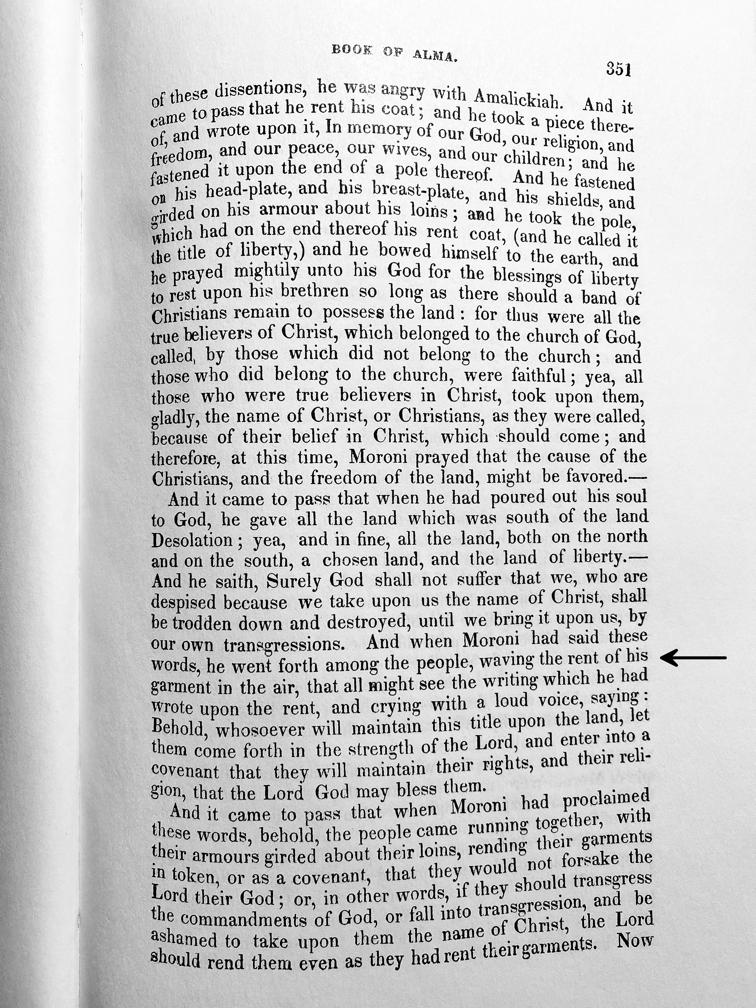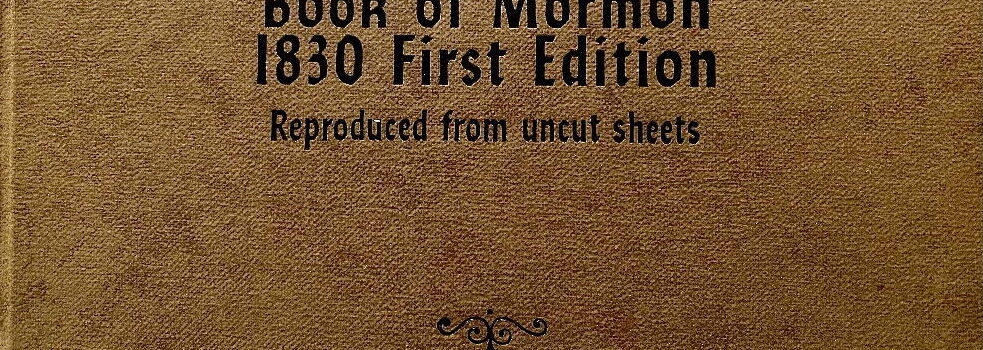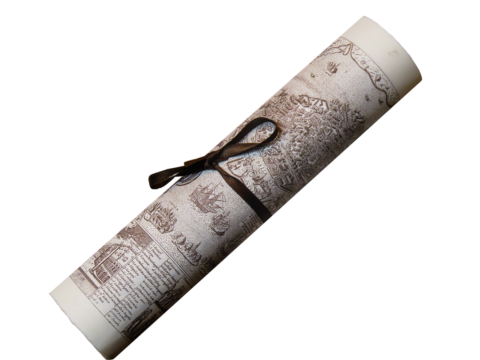Although this is about the awkwardness of many phrases found in the Book of Mormon it is not an attempt to discredit it. If my reader is looking for reasons to dismiss the book as a fraud, this will not be helpful. The fact is, those awkward expressions are one of the most compelling proofs of its authenticity.
Samual Clemens, the gifted author with the pen name Mark Twain, once wrote about the Book of Mormon as part of his book “Roughing It”. His comments are not altogether complimentary nor are they altogether dismissive. In fact, he specifically allows that the book might be authentic. Twain was having fun, as he always seemed to do when he wrote –
Mark Twain’s Quote
“All men have heard of the Mormon Bible, but few except the “elect” have see it, or, at least, taken the trouble to read it. I bought away a copy from Salt Lake Lake. The book is a curiosity to me, it is such a pretentious affair, and yet so “slow,” so sleepy; such an insipid mess of inspiration. It is chloroform in print. If Joseph Smith composed this book, the act was a miracle — keeping awake while he did it was, at any rate. If he, according to tradition, merely translated it from certain ancient and mysteriously-engraved plates of copper, which he declares he found under a stone in an out-of-the-way locality, the work of translating was equally a miracle, for the same reason.”
Twain, M. (2019). Roughing It by Mark Twain. In bubblin.io. https://bubblin.io/book/roughing-it-by-mark-twain/205
Twain uses his typical, light-hearted, off-hand style that we all find entertaining, if not accurate. I am a staunch believer in the Book of Mormon as a volume of divine origin in more than one way, but I have never found Twain’s comments offensive. He is poking fun at the book, but that was his prerogative as a casual observer. After all, Joseph Smith, the man who produced the book, said, “I don’t blame anyone for not believing me, if I had not experienced it myself, I would not have believed it myself.” Twain was an honest man about all this and we do him an unjustified disservice if we ignore his preface to “Roughing It” which begins with –
This book is merely a personal narrative, and not a pretentious history or a philosophical dissertation. It is a record of several years of vagabondizing, and its object is rather to help the resting reader while away an idle hour than afflict him with metaphysics, or goad his with science.
Twain, M. (2019). Roughing It by Mark Twain. In bubblin.io. https://bubblin.io/book/roughing-it-by-mark-twain/10
Some Awkward Passages
My personal observation about the awkward texts is that the Book of Mormon is a translation on a word-by-word basis, as opposed to a full-on translation which completely rewords and rephrases so as to put it into perfect English. So the Semitic phraseology and sentence structure often comes through. Many awkward expressions in the first edition were corrected in later editions.
But we still find phrases like the following (words of special interest are in italics):
- “But behold, I have obtained a land of promise, in the which things I do rejoice.” 1 Nephi 5:5
- “… and I beheld that it was most sweet, above all that I ever before tasted …” 1 Nephi 8:11
- “… those who had come at and were partaking of the fruit.” 1 Nephi 8:27
- “… as I sat pondering in mine heart …” 1 Nephi 11:1
- “… he had gone from before my presence.” 1 Nephi 11:12
- “… insomuch as if my frame had no strength.”* 1 Nephi 17:47
- “… that I should engraven the heads of them …” Jacob 1:4 [“head” means most notable]
- “… they may be distinguished above all the people …” Mosiah 1:11
- “… waving the rent
partof his garment in the air … “Alma 46:19
This is but a tiny sample but I want to focus for a moment on two examples of awkward expressions that have been adjusted to more comfortable English. The phrases “insomuch as if my frame had” and “waving the rent of his garment” occurs on pages 46 and 351 in the first edition of the Book of Mormon (page 351 pictured below). Later editions changed the “insomuch as if my” to “insomuch that my” and added the word “part” so as to read “waving the rent part” as seen in Alma 46:19. These made the text more comfortable but lost the Semitic phraseology. For example, in Hebrew the word for “rent” doesn’t need the word “part” to describe a “rent part”; that he is waving a piece of the garment is understood. There are many other such changes to more comfortable English.
Text Corrections by the Original Authors
Another interesting feature of the Book of Mormon is the use of the word “or” where it appears the author is correcting, or at a minimum clarifying the words immediately preceding the “or”. There are many occurrences of the four-character sequence ” or,” [space, “o”, “r”, comma] in the text. Of these, three are particularly interesting.
- “… they are written in the book which thou beheld proceeding out of the mouth of the Jew; and at the time they proceeded out of the mouth of the Jew, or, at the time the book proceeded out of the mouth of the Jew …” 1 Nephi 14:15
- “… and by them shall all things be revealed, or, rather, shall secret things be made manifest …” Mosiah 8:2
- “… they buried their weapons of peace, or they buried the weapons of war , for peace.” Alma 24:19
- “And it came to pass that king Noah sent his armies against them, and they were driven back, or they drove them back for a time; therefore they returned rejoicing in their spoil.” Mosiah 11:18
In all of these instances, the writer is making a correction. The third one is peculiar because the correction is so obvious. It could be called a clarification, of course, but if these words were written within the last few hundred years, the writer could easily have erased and written his preferred words. But that option is unavailable when you are engraving metal plates. The fourth one is difficult to understand, but it is obvious that the writing is making a correction.

Some Final Notes
There have been thousands of changes made in the book since its first edition. In fact, some corrections were made during the first edition as people read the book and asked the printer to fix things. The majority of these were spelling and punctuation, which is not a surprising fact considering the fact that the typesetting was a manual process and the original manuscript given to the printer was completely devoid of punctuation. Many textual changes have come in later editions like the “rent” one above. One might say that they prove that the book was not translated by the gift and power of God. However, such a statement presumes God would prevent any errors from occurring. I think it is impossible that any study of any part of life on earth could support such a claim. It is more likely, I think, that God wanted the Hebrew to show through.
There have also been a number of changes to pronouns. These changes bother some people, but not me. It is true that Joseph Smith said “The Book of Mormon is the most correct of any book on this Earth, and the keystone of our religion, and a man would get nearer to God by abiding by its precepts, than any other book.” It is clear to me that he was referring to the spiritual guidance found in the book rather than any perfection in the use of the English language.
The most significant textual change of which I am aware occurred when “Mary the mother of God” was changed to “Mary the mother of the Son of God”. Those who understand the theology of the Book of Mormon will recognize this as a clarification rather than a change. The book was translated by a prophet and this change had at least the approval of a prophet.
We might also remember that the original authors complained about their own linguistic ability when they mentioned “our weakness in writing”. Ether 12:23




